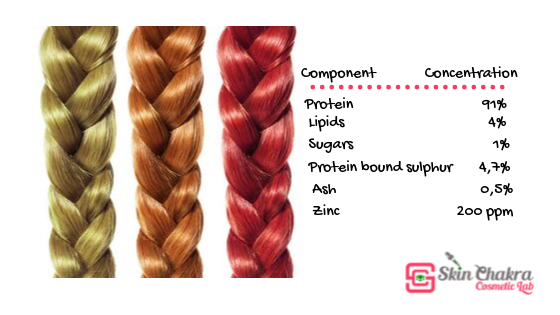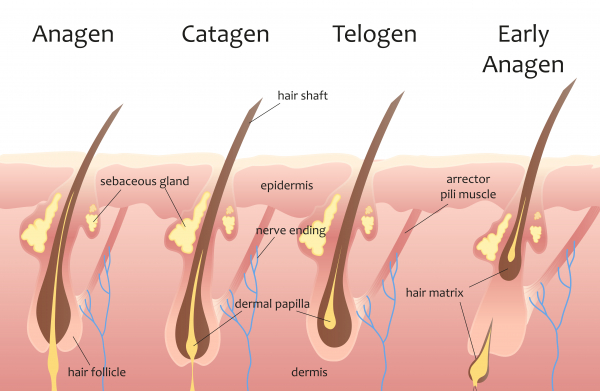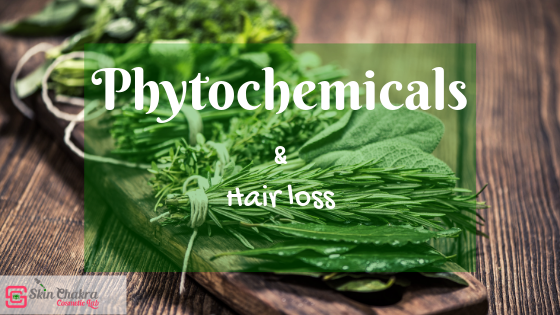A while ago I shared this interesting open access article on our telegram channel (are you already subscribed?). I seriously encourage you to go and read the whole article but since I know that the smartphone generation does not have the patience to read such a long article, let alone understand it, I'll sum up the highlights for you.
This is a detailed study about the efficacy of a few phytochemicals in preventing or reversing hair loss. Before we go to the phytochemicals and their function and efficacy, we need to have a short review of the hair structure and different causes of hair loss (stay with me, this could be really boring if you have no background in biology and physiology and no interest in any of them but it doesn't take long)

Let's talk about hair
What you see as hair is a non-living keratinized structure protruding from the epidermis. Hair consists of a central core of closely packed cortical cells sheated by thin layers of cuticle that overlap each other from root to the tip.
The whole action actually happens in the subdermal and hypodermal part where the hair follicle and the dermal papilla sit.
The hair follicle is made of epithelial cells that produce hair. The papilla is enclosed at the base of the hair follicle. It is a lump of connective tissue surrounding nerves and blood vessels nourishing the hair follicle.

Hair growth cycyle
Mature hair follicles grow, live and die in regular cycles. Each cycle is divided into 4 phases (in older books and journals, 3 cycles are mentioned).
These cycles are:
anagen is the growth stage. Terminal scalp fibres will remain in anagen for 2–6 years, with hair growth at a rate of ca. 1 cm per month.
catagen is the regression phase
telogen is the resting phase
and
exogen is the fibre shedding phase
In a healthy scalp 80% - 90% of hair follicles are always in the active growth phase. When this ratio is reduced (exogenous and endogenous factors), hair loss becomes significant.
Hair loss is not equal hair loss (at least) for the experts. This article has mentioned different types of alopecia together with the cause and the appearance.

Treating hair loss with phytochemicals
Caffeine
Caffeine has been tested in several in vitro and in vivo studies. Multiple commercial products (cosmetic, OTC and drugs) are already on the market claiming hair growth and reduction of hair loss.
According to this article, caffein increases hair follicle growth rate, increases hair shaft elongation, decreases necrosis and apoptosis and increases the percentage of anagen hair.
EGCG (epigallocatechin gallate)
from camellia sinensis
This is a polyphenol, most abundant in tea. EGCG prolongs the anagen phase, reduces the oxidative cell damage and affects pro-inflammatory T cells. In addition to that, EGCG increases the epidermal thickness, increases total hair density, increases hair shaft production and increases cell proliferation.
Trifolium pratense flower extract
Red clover extract reduces micro inflammation, increases the anagen/telogen ratio, stimulates extracellular matrix.
Rubus ideaus (raspberry)
Increases dermal blood flow and regulates androgen receptors in dermal papilla cells.
Capcaicin from capcisum annuum
Stimulates the perifollicular nerves and hair follicle immune system.
Rosemary oil and extract
Reduce scalp itchiness
Crude onion juice (don't roll your eyes. It really works)
increases hair growth by induction of immunological reaction
Serenoa repens (saw palmetto)
Increases terminal hair count.
Panax ginseng (red ginseng extract)
Increases cell proliferation and regulates androgen receptors
Further reading and references:
Madaan, Alka, et al. "Review of Hair Follicle Dermal Papilla cells as in vitro screening model for hair growth." International journal of cosmetic science 40.5 (2018): 429-450.
Daniels, Gabriela, et al. "Can plant‐derived phytochemicals provide symptom relief for hair loss? A critical review." International journal of cosmetic science (2019).
Evans, Trefor, and R. Randall Wickett, eds. Practical modern hair science. Allured Business Media, 2012.
BeHappy and have fun





